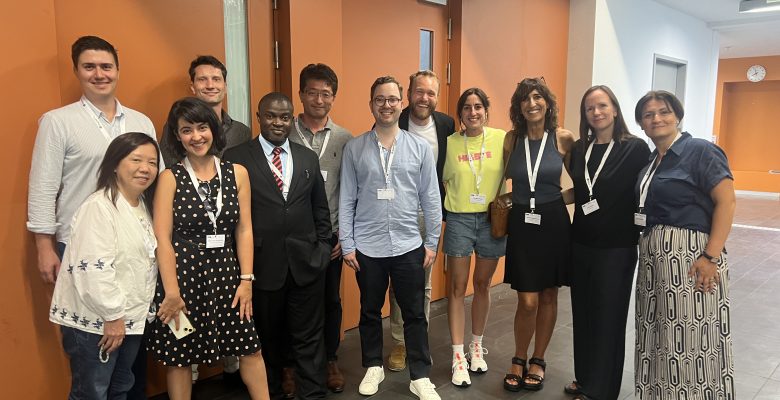Regional Promoters
Regional Promoters (RPs) are an integral part of EAPP’s commitment to enhancing the diversity of people and ideas in the field of personality psychology to better represent its membership and global communities and also promote an inclusive and respectful climate (please see EAPP Diversity & Inclusion memo).
EAPP regional promoters’ main task is to ensure that membership and perspectives from the different regions of Europe and the rest of the world are well represented in EAPP. More specifically, EAPP regional promoters are tasked with:
1. Promoting personality psychology in its broadest definitional (i.e., to include, besides traits, other relevant individual and dispositional constructs such as identity, personal narratives, cognitive styles, etc.) and disciplinary sense (e.g., research, teaching, and applications) in their respective regions.
2. Recruiting new members for EAPP from their respective regions. The EAPP membership offers many benefits, please see the Why Become a Member page, but most importantly, it provides the opportunity to have a say in shaping the future of personality psychology in Europe and beyond.
3. Promoting EAPP activities (e.g., conferences, summer schools, etc.) and resources (e.g., journals, awards, grants) in their respective region – See: EAPP meetings, EAPP awards, and the Inaugural Editorial for the New Journal Personality Science: “Personality Science: United in Diversity”
4. Assisting EAPP with its diversity and inclusion goals by actively engaging in outreach activities that bring new membership and topical/professional perspectives from their world regions and also from (a) groups historically underrepresented and marginalized in academia and professional organizations –i.e., ethnocultural minorities, women, sexual minorities, individuals with disabilities, and also (b) junior personality researchers.
Regional promoters hold office for two years, and they may serve no more than two consecutive terms. Regional promoters provide a report of their yearly activities to EAPP’s EC.
All EAPP members are encouraged to contact their respective Regional Promoters with their ideas and questions regarding issues such as how to best promote personality science in their world region, how EAPP might best serve them, or just to say hi!
Regional Promoters by Area
Southern Europe
Elisabetta Crocetti is a Full Professor in Social Psychology at the University of Bologna. She is the PI of the ERC-Consolidator project IDENTITIES “Managing Identities in Diverse Societies: A Developmental Intergroup Perspective with Adolescents” that examines how the interactions that adolescents with and without a migrant background have in different spheres of life affect their identities and their physical, psychological, and social well-being. She is also the Editor-in-Chief of Identity: An International Journal of Theory and Research, Associate Editor of European Journal of Personality and of New Directions for Child and Adolescent Development. She is involved in several scientific associations and she is the Secretary of the European Association for Research in Adolescence (EARA).
Nebi Sümer is a professor of psychology at Sabanci University, Faculty of Arts and Social Sciences, Istanbul, Turkey. He has two main research interests. One focuses on close relationships, especially the attachment dynamics and parenting behaviors from the cultural perspective. The other focuses on transportation safety and driver behavior. He has conducted large-scale studies on attachment and parenting behaviors, aberrant driver behaviors, and hazard perception abilities of novice drivers. He has thoroughly published scientific articles, chapters, and books in these areas and received funding from national and international agencies. He also runs research and has publications on the issues concerning personality assessment, effects of unemployment, teaching of psychology, and advanced statistics. He received his Ph.D. from Kansas State University and spent a year as a Fulbright research scholar at Cornell University. He is a member of the Science Academy Society in Turkey.
Central Europe
Brice Canada
Brice Canada is an Assistant Professor of personality psychology at the University of Lyon 1, France, and a member of the Laboratory of Vulnerability and Innovation in Sport. Based on an epidemiological approach, his research focuses initially on the relationship between personality and health across the lifespan. In addition, using a personalized medicine approach, the second part of his research focuses on the role played by personality traits in the effectiveness of rehabilitation programs for patients suffering from chronic illnesses.
research focuses initially on the relationship between personality and health across the lifespan. In addition, using a personalized medicine approach, the second part of his research focuses on the role played by personality traits in the effectiveness of rehabilitation programs for patients suffering from chronic illnesses.
Amber Gayle Thalmayer
Amber Gayle Thalmayer (PhD University of Oregon 2013) is an assistant professor at the University of  Zurich for Personality, Mental Health, and Culture. She is the recipient of a 5-year Swiss National Science Foundation Fellowship, which is supporting the establishment of a longitudinal study of personality development and mental health among emerging adults in Namibia, Kenya, and South Africa, among other cross-cultural projects. She is currently serving as an Associate Editor for Personality and Social Psychology Review, on the International Committee of the Society for Personality and Social Psychology, on the editorial board of the European Journal for Personality and on the executive board of the World Association of Personality Psychology.
Zurich for Personality, Mental Health, and Culture. She is the recipient of a 5-year Swiss National Science Foundation Fellowship, which is supporting the establishment of a longitudinal study of personality development and mental health among emerging adults in Namibia, Kenya, and South Africa, among other cross-cultural projects. She is currently serving as an Associate Editor for Personality and Social Psychology Review, on the International Committee of the Society for Personality and Social Psychology, on the editorial board of the European Journal for Personality and on the executive board of the World Association of Personality Psychology.
Northern Europe
Liisi Ausmees (Ph.D., University of Tartu) is working as a research fellow and lecturer of personality psychology at the Institute of Psychology, University of Tartu, Estonia. Her research centres on the interplay between personality traits, positive and negative affective experience, life satisfaction, and health. Collaborating with colleagues abroad, her current work also focuses on age differences in personality traits and the reasons behind these differences. At the University of Tartu, she teaches an introductory psychometrics course and supervises undergraduate as well as graduate student research projects. She has also worked as a clinical neuropsychologist at the inpatient rehabilitation unit of Tartu University Hospital.
Ingo Zettler is a Professor in Personality and Social Behavior at the Department of Psychology and the Copenhagen Center for Social Data Science (SODAS), both University of Copenhagen (Denmark). Prior to moving to Copenhagen, he studied at the University of Bonn, conducted his PhD at Aachen University, and worked at the University of Tübingen (all Germany). His research interests include aversive and prosocial personality characteristics, dis/honest and im/moral behavior, or considering personality psychology in applied contexts.
Eastern Europe
Sofya Nartova-Bochaver is a Russian psychologist (Doctor of Sciences- Habilitation), full Professor at the HSE University in Moscow. A graduate of Lomonosov Moscow State University (1984). The areas of professional interests are Personality and individual differences and Environmental psychology (natural and built environments). Most preferred topics are: personal authenticity; moral phenomena, like justice, gratitude, and forgiveness; home and natural environments (including attachments to pets and plants); psychological well-being, emerging adulthood. Sofya is an author of original Theory of psychological sovereignty (2005); actively participates in international scientific cooperation, presenting many foreign studies to Russian scientists and adapting foreign research tools in Russia. She is an author of more than 250 publications, a participant or supervisor of seven international projects, a guest editor in some special issues and active international reviewer.
Narine Khachatryan is a head of the chair of Personality Psychology at Yerevan State University since 2011 and is the director of the MA program in personality psychology. She received her doctoral degree (kandidat nauk) in psychology in 2006, and is an Associate Professor (docent) since 2008. Narine has been a fellow of different international programs both as a faculty member and as a researcher (JFDP, HESP, ReSET). Since 2011, she has been leadingthe “Personality and Social Context” lab in YSU. She is also the member of the Faculty of Philosophy and Psychology scientific council of and was recently elected as a member of YSU Board of Trustees. Narine’s research interests are in the areas of personality and culture, self and social identity, self-regulation. She has taught courses on personality theories, methodology of personality psychology, counselling psychology. Narine has led several research projects in Armenia related to values, beliefs and social behavior and has collaborated in cross-cultural research projects with colleagues from Poland, Russia, China, UK, Germany. She also works as a practicing psychologist, providing counselling for individuals and psychoeducation for organizations.
UK and Ireland
Kostas Papageorgiou is a Senior Lecturer (Associate Professor) in Developmental Psychopathology, Director of the MSc in Applied Developmental Psychology, and the Director of the InteRRaCt Lab at Queen’s University Belfast. He has served previously as an Associate Professor at Tomsk State University, Russia. Kostas is also an Associate Editor for the Journal Acta Psychologica and the journal Personality and Individual Differences; and member of the Editorial Board for Frontiers in Psychology. He participates actively in dissemination of scientific findings in academic audiences and the public with his research to be the subject of frequent media coverage from the world’s largest international broadcasters (e.g., BBC World Service, CNN, Times and Forbes) resulting so far in more than 1,000 pieces of coverage worldwide. Kostas current research interests involve exploring the degree to which dark personalities, with a particular focus on narcissism, contribute to resilience and performance across contexts. The objective of his research is not to rehabilitate dark personalities, but to contextualize them in a complex web of societal costs and benefits. In so doing, he plans, through collaborative work, to be able to look into ways in which society can harness the energy of dark personalities while also curtailing their potential for harm.
Andres Gvirtz
Andrés Gvirtz is an Assistant Professor at King’s Business School, King’s College London and a Research Affiliate at the King’s Institute for Artificial Intelligence. He holds an Honorary Research Associate position at Peterhouse, University of Cambridge. Andrés has two main research streams, he aims to improve our understanding of behaviour through a combination of micro-level personality information and macro-level contextual information, at the core combining ‘who’ somebody is, with ‘where’ somebody is. His second research stream focuses on technology, and more specifically on Generative AI as a disruptor in the personalisation space. Andrés holds a PhD in Psychology from the University of Cambridge and was a Visiting Fellow at Harvard. He received a MPhil in Psychology (University of Cambridge) and a BA in Economics and Psychology (Clark University).
research streams, he aims to improve our understanding of behaviour through a combination of micro-level personality information and macro-level contextual information, at the core combining ‘who’ somebody is, with ‘where’ somebody is. His second research stream focuses on technology, and more specifically on Generative AI as a disruptor in the personalisation space. Andrés holds a PhD in Psychology from the University of Cambridge and was a Visiting Fellow at Harvard. He received a MPhil in Psychology (University of Cambridge) and a BA in Economics and Psychology (Clark University).
At home, you can often find Andrés in the kitchen, where he applied to be the sous-chef after short courses at Leiths School of Food and Wine (London) and Le Cordon Bleu (Paris) – outcome still outstanding.
Middle East
Maria-Jose Sanchez-Ruiz has a PhD in psychology from the Universidad Autonoma de Madrid, which was carried out at the Institute of Education and the University College of London (UCL). Since then she has worked extensively with the trait Emotional Intelligence program at this institution. During her work at the Lebanese American University, she expanded the nomological network of trait Emotional Intelligence by validating its assessment and investigating its associations with mental health outcomes such as body image dissatisfaction, aggressiveness, coping strategies, and well-being. She has published empirical papers in reputable journals in psychology, as well as book chapters (for more details, see https://soas.lau.edu.lb/about/people/maria-jose-sanchez-ruiz.php). Many of her contributions have shown that trait EI plays a relevant role in academic performance and adjustment. Her research findings have inspired Yes to Emotions in Youth as an evidence-based trait EI program for vulnerable youth in public schools in Lebanon funded by Grand Challenges Canada, National Institute for Health Research (NIHR). Through this initiative, and her work for over 10 years in Lebanon, she has been training and mentoring young researchers in the field of personality and individual differences (for more details, see the news on her Research Excellence Award at LAU.
Dr. Waters is an Assistant Professor of Psychology at New York University Abu Dhabi and a Global Network Assistant Professor of Psychology in the Steinhardt School of Culture, Education, and Human Development at New York University. He received his PhD from Emory University in 2013. His research focuses on how early experience informs our understanding of self and other. He pursues this work both in the domain of narrative identity/adult personality and attachment theory. In his work on narrative identity and personality he focuses on two major questions: 1) How and why are individual differences in autobiographical narratives related to psychological health and adaptation? 2) Does autobiographical narrative reflect a stable domain of personality/identity? In attachment, his work focuses on three overarching research questions: 1) Does early caregiving shape the development of script-like attachment representations? 2) How do stability and change in attachment representations unfold across development? 3) How are attachment representations organized in the mind?
North America
Friedrich (Fritz) Götz is an assistant professor in social/personality psychology at the University of British Columbia in Vancouver, Canada, where he directs the Personality and Geographical Ambiance (PANGEA LAB). His primary research focus is on the causes and consequences of regional personality differences. He is also interested in personality assessment, person-environment–fit, and personality development across the lifespan. Prior to moving to Canada, Friedrich did a remote post-doc at UC Berkeley and got his PhD from the University of Cambridge where he studied under Dr Jason Rentfrow. Before that, he earned a BSc in Psychology from the University of Konstanz, Germany and bounced around the globe, doing exchange semesters at Stony Brook University and the University of Vienna and interning with research labs at the Karolinska Institute in Stockholm and Hong Kong University.
Michal studies humans in a digital environment using cutting-edge computational methods, AI and Big Data. He has co-authored Modern Psychometrics (a popular textbook) and published over 90 peer-reviewed papers in leading journals including Nature Scientific Reports, Proceedings of the National Academy of Sciences, Psychological Science, Journal of Personality and Social Psychology, and Machine Learning, that have been cited over 15,000 times. He is among the Top 1% of the Highly Cited Researchers according to Clarivate. His research inspired a cover of The Economist, a 2014 theatre play “Privacy”, multiple TED talks, a video game, and was discussed in thousands of books, press articles, podcasts, and documentaries. Michal was behind the first press article warning against Cambridge Analytica. His research exposed the privacy risks that they have exploited and measured the efficiency of their methods. He holds a doctorate in psychology from the University of Cambridge and master’s degrees in psychometrics and in social psychology. He used to work as a post-doctoral scholar at Stanford’s Computer Science Department, the Deputy Director of the University of Cambridge Psychometrics Centre, and a researcher at Microsoft Research (Machine Learning Group).
Asia
Michelle Yik’s research centers on human emotion and culture. Her current scope of research surrounds three crucial areas of the human experience: the architecture of emotion, personality and well-being, and the experience of love in cultural contexts. Her first line of research concerns the development of a 12-point circumplex model in the English and Chinese languages to describe emotion. More recently, she is collaborating with researchers from 32 communities to examine the architecture of emotion and its relationship with personality and psychological well-being. Her second line of research targets the relationship of pleasure-displeasure, focusing on how people in Eastern (Western) culture can (cannot) feel happy and sad at the same time. To thoroughly examine the role of culture on this happy-sad relationship, she initiated an experience-sampling study and is currently recruiting collaborators around the globe. Her third line of research concerns how people of different cultures understand (romantic) love, while engendering diversified understanding by stretching the investigation beyond the Western, educated, industrialized, rich and democratic (WEIRD) societies to include communities on six different continents.
Atsushi Oshio is a Japanese personality psychologist and a professor in Faculty of Letters, Arts and Sciences, Waseda University. He has a Ph.D. from Graduate School of Education, Nagoya University and began his career in the study of narcissistic personality. Now his interests have expanded to a wide range of personality psychology, including Big Five personality traits, Dark Triad, personality development, regional differences, health, adaptation, and birth-cohort-changes of psychological traits. He has published more than 200 articles and 30 books in Japan. He currently serves as editor-in-chef of The Japanese Journal of Personality and is an associate editor of Personality Science.
Oceania
Luke Smillie is an Associate Professor of Psychology at the University of Melbourne, Australia, and director of the Personality Processes Lab. He received his PhD from the University of Queensland and completed postdoctoral research fellowships at Goldsmiths, University of London. He has published over 100 scholarly articles and chapters on a range of topics in personality, including neurobiological and motivational accounts of individual differences, the correlates and consequences of extraversion and other basic traits, and the links between personality and social behaviour. He is currently the President of the Australasian Congress for Personality and Individual Differences (ACPID), and an Associate Editor at both the Journal of Personality and the Journal of Personality and Social Psychology: Personality Processes and Individual Differences.
 Patrick Dunlop
Patrick Dunlop
Patrick Dunlop is a Professor at the Curtin University Future of Work Institute (Perth, Australia) and a registered Organisational Psychologist in Australia. His research interests relate to all the processes involved in personnel recruitment, assessment, and selection, which is where individual differences and good measurement can be important. Most recently, Patrick has been focusing on how generative AI such as large language influences the assessment of individual differences in high-stakes selection settings.
Latin/Central/South America
Dr. Cristian Zanon is a professor of Quantitative Methods at the Universidade Federal do Rio Grande do Sul (UFRGS). He received his master’s and a doctorate in Psychology from UFRGS, where he has been teaching psychological assessment, statistics, and psychometrics since 2018. His research focuses on adapting, developing, and refining personality and well-being measures using classical and modern test theory (i.e., IRT). Other research interests are related to Cross-Cultural and Educational Psychology. Additionally, he is currently Associate Editor of the journal Psicologia: Reflexão e Crítica/Psychology: Research and Review (1.429 – 2-year Impact Factor), is the Coordinator of the National Association for Research and Graduate Psychology (ANPEPP-Brazil) Working Group on Positive Psychology and Creativity and is the Treasurer of the Brazilian Association of Positive Psychology (ABP+).
Rolando Diaz-Loving obtained his PhD in Social Psychology from the University of Texas at Austin in 1981 and the “Distinguished Alumnus Award” in 2001. He is a Full Professor and Head of the Psychosocial Research Unit at the National Autonomous University of Mexico. He has directed 49 doctoral, 25 masters and 24 bachelor level theses and dissertations. His publications on personality and social psychological processes are the basis for the creation of a Mexican ethno-psychology. His bio-psycho-social-cultural theory on human relationships has guided innumerable studies and programs about family and couple of relationships, and his studies in the area of sexual behavior, contraceptive behavior, health and HIV are the foundation for numerous intervention programs. The abundant work of Diaz-Loving as author includes the co-edition of 16 volumes of Social Psychology in Mexico, 193 articles in scientific journals, 173 chapters in specialized books, 19 research books and two textbooks.
Africa
Dr Sebastiaan (Ian) Rothmann is a professor in Industrial/Organisational (I/O) Psychology and Director of the Optentia Research Unit at the North-West University. Prior to this, he was a professor in I/O Psychology and head of the Department of Human Sciences at the University of Namibia. He completed Master’s (1986; cum laude) and PhD (1996) degrees in Industrial Psychology. Ian is interested in the assessment and development of individual, relational, and organisational potential, specifically within multicultural and cross-cultural contexts. His research focus is on positive organisations, capabilities, and well-being (flourishing, engagement of people in work and organisational contexts as well as in non-work contexts. Furthermore, he is the author/co-author of 230 articles and chapters in peer-reviewed journals and handbooks.
Stephen Asatsa, PhD is a Senior Lecturer in the department of Psychology at the
Catholic University of Eastern Africa, Kenya. He holds a PhD in Counseling Psychology from the same university (2018). He is a strong advocate for Indigenous
knowledge systems and decolonization of knowledge. He is a mixed methods researcher focusing on Personality development, Thanatology and the role of traditional cultural practices in mental health and wellbeing. He is the eNewsletter editor, International Society for the Study of Behavioural Development (ISSBD). He is currently the principal investigator for a project: Traditional Luhya Mourning Rituals:
A Cultural Evolutionary Approach to Understanding Community Wellbeing, Cooperation, Cultural Transmission and Cultural Resilience in a Kenyan Indigenous Community. He is also the country lead researcher (Kenya) for a collaborative longitudinal study : The Africa Long Life Study: A Longitudinal Exploration of the Psychological Development of Young Adults in Kenya.


















